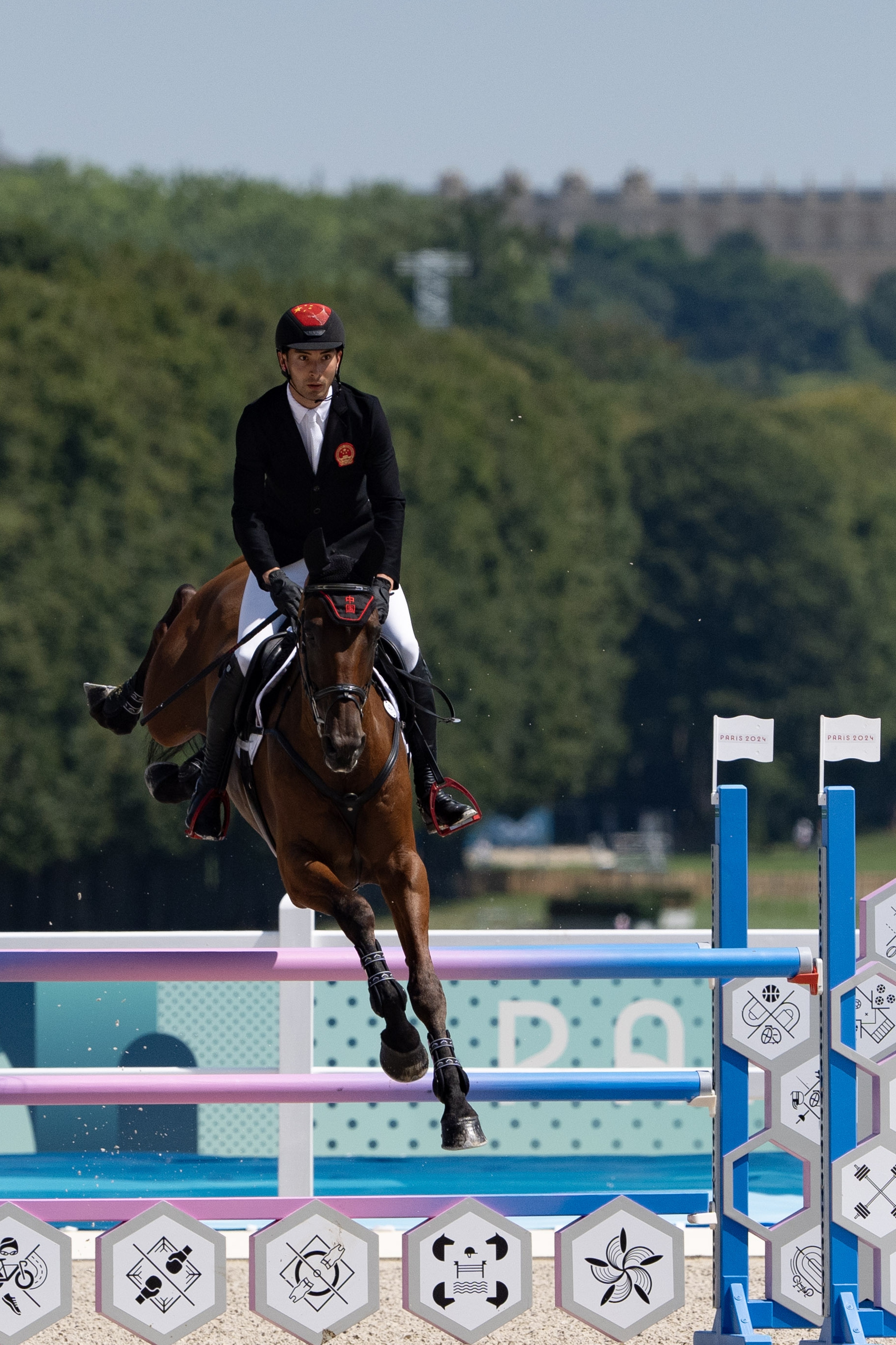
Alex Hua Tian of China riding his horse Chocs competes during the eventing individual jumping final of equestrian at the Paris Olympic Games in Versailles, France, on July 29, 2024. Photo: VCG
The Paris 2024 Olympics was considered a golden chance for the equestrian sport to grow its popularity in China, not only because of the impressive performances of international athletes, but also due to the expectations of the Chinese riders.
Although the result showed that the Chinese equestrian athletes' performances in Paris fell short of expectations, International Equestrian Federation (FEI) President Ingmar de Vos said there is a huge potential for Chinese equestrianism to grow thanks to the burgeoning interest in the sport.
"The Chinese market is very important for us because it has been growing tremendously," De Vos told the Global Times. The number of equestrian clubs in China has skyrocketed from 20 in 2011 to 2,000 in 2024, according to the FEI.
The FEI has been instrumental in this transformation focusing on fostering a thriving equestrian culture in China - a nation traditionally not known for its deep roots in the sport.
"The uniqueness of our sport attracts many people," De Vos noted. "The lifestyle surrounding equestrian sports and the unique bond with horses is something exceptional that resonates deeply with the Chinese people."
Challenges remain Despite these positive developments, challenges remain. During the Olympics, there were discussions around fairness and performance on Chinese social media, particularly regarding Chinese equestrian athlete Alex Hua Tian.
Footage showed a judge unexpectedly appearing in front of an obstacle when Hua Tian and his horse Chocs made a sidestep to the left before jumping right over the obstacle. The horse brushed against a flag on the left side of the obstacle, resulting in a penalty. Ultimately Hua Tian finished his Paris 2024 Olympics campaign in the 23rd place in the individual competition.
While some controversy arose, De Vos remains confident in the integrity of the competition.
"I understand that is disappointing, but this was just the decision of the ground jury," De Vos told the Global Times, referring to Hua Tian's experience. "I don't think there was any problem with the fairness of the competition."
Sun Huadong, another Chinese rider competing at the Paris 2024 Olympics, had to withdraw from the cross-country phase due to severe swelling in his horse's leg.
"I think it was the right decision to withdraw the horse because the horse's fitness is always our first priority. We need to thank the rider for making that decision and for thinking in the interests of the horse first," De Vos told the Global Times, referring to Sun's early retirement with his horse Lady from competition.
"And it's a pity. It's a big disappointment I can imagine, but it is what we have to do."
De Vos emphasized that horse welfare is always the first priority, highlighting the commitment to ensuring that the growth of the sport does not compromise the well-being of the animals involved.
Speaking about the highlights of Chinese riders, De Vos is confident that they will likely deliver better performances in the future.
"[The Chinese riders] have everything ready to deliver a great performance. So [in] the future, it's looking very good and they are really at [a high] level," De Vos said.
Building foundation Looking beyond individual events, the FEI's approach to supporting Chinese athletes involves comprehensive strategies aimed at sustainable growth.
Collaborative efforts with the Chinese government and other stakeholders focus on developing specialized veterinary education programs.
Education plays a critical role in the FEI's strategy.
The federation is working closely with the Chinese Equestrian Association and various governmental bodies to create robust educational programs.
These initiatives include translating FEI courses into Chinese, or Putonghua, and establishing specialized training for veterinarians and coaches.
"Our goal is to educate people from within China to ensure they are not dependent on external expertise," De Vos explained. This approach aims to build a self-sufficient equestrian community in China that can sustain its growth and development independently.
The FEI is leveraging the popularity of equestrian heroes like Hua Tian to inspire younger generations.
Hua Tian's success and social media presence serve as powerful tools for promoting the sport and attracting new talent.
"To have heroes like Alex is crucial for promoting our sport," De Vos said. "We are very grateful for what he does on social media and how it helps bring attention to equestrian sports in China."
Looking ahead, the FEI's priorities include continuing to support the growth of equestrian sports in China through educational programs, enhancing horse welfare, and fostering a competitive environment that can produce world-class athletes.
"We have seen that there have been a lot of horses that have been imported into China. But what is always our first priority is horse welfare. We agreed with the Minister of Agriculture and Rural Affairs to help them in developing special courses for veterinarians," he added. "This is something that we also do together with the Hong Kong [SAR] Jockey Club."
De Vos noted that the FEI is committed to ensuring that the growth of equestrian sports brings lasting benefits to the sport and its practitioners within China.
The increasing number of international competitions in China and the development of programs such as the FEI League of Nations and World Cup as well as the FEI World Challenge are part of this strategic push.
"The number of international competitions in China is increasing," he said. "With the Chinese Longine League of Nations, FEI Jumping World Cup, and FEI World Challenge, I think we have a bright future in China."




